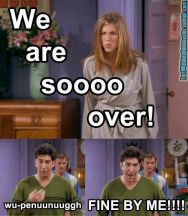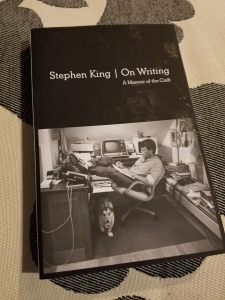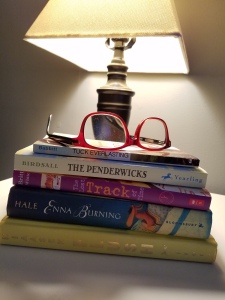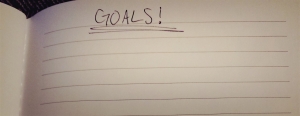
A Writing Crisis is so much more than Writer’s Block, although that can be a crisis in and of itself.
Writing Crises can come in a variety of flavors, all of them bitter. There’s the “What am I even doing anymore?” and the “I’m not good enough why should I even try?” Don’t forget the dreaded “writer’s block” and the “I never have time to write.”
My current crisis is two fold. First, I’m not sure what type of book I’m writing anymore. I thought I was writing a stand-alone upper middle-grade novel, but the word count has grown so far beyond the maximum word count for that genre that I just don’t know anymore. Second, I am torn between writing what I want to write and writing what will sell. I’d like to write a dreamy, introspective work of magical realism, but c’mon, do kids really like dreamy, introspective stuff? Probably some of them, but probably not many.
Both of these issues have stopped me in my writing tracks. My fingers hover where they used to click across the keyboard as quickly as The Flash. My eyes gaze blankly at the computer screen where they used to ignite with Ideas and Inspiration while merrily watching my document grow and grow and grow.
Now my document doesn’t grow at all. Or it seems like it.
When you’ve hit a wall like this, when you’ve lost your energy, when everything seems dramatically (cue swooning onto a chaise lounge) impossible, what do you do? Where do you go next? How do you move forward and complete your work?
While each writer has to determine their own methods for dealing with Writing Crises, here are some that I’m using right now, that I hope will work for you as well!
First, write a mission statement
A mission statement can help you reconnect with your original purpose for writing. What did you want to achieve? Whom did you want to talk to? What is that core story or character that really captivated your imagination and propelled you to open a blank document and type away?
Write a statement that captures that old spark. Or, perhaps you realize that your mission has changed and you need this new statement to ground yourself in your new goals for your work. That’s cool, too. Just rediscover your purpose!
 Second, like Ross and Rachel, take a break
Second, like Ross and Rachel, take a break
Yeah, I went there. A Friends reference. Come on, you expected it. Besides, the comparison works. Ross and Rachel took a long and messy break but eventually got together and had that cute kid. So, too, will you and your project eventually reunite and bring life to something beautiful.
Taking a break from your project can give you objective distance from your current problems and questions so that you can make the best decisions for your work.
Third, read
Read something totally different from what you’re writing. Or, read more  works in your genre that inspire you. Or, read craft books to help you over your writerly hurdles. I’m currently reading Stephen King’s On Writing, and his statements about writing your truth–“If you begin to lie about what you know and feel while you’re down there, everything falls down”–have helped me write and feel confident about my mission statement for my current project.
works in your genre that inspire you. Or, read craft books to help you over your writerly hurdles. I’m currently reading Stephen King’s On Writing, and his statements about writing your truth–“If you begin to lie about what you know and feel while you’re down there, everything falls down”–have helped me write and feel confident about my mission statement for my current project.
And today I visited the local used bookstore and brought

home a huge stack of books in my genre. I’m hoping these examples will reenergize my belief in my own tale and reveal how other authors balance their true stories with the audience-focused limitations and expectations of the genre they write for.
Fourth, rearticulate your goals.
I love making lists. And once you and your project are on speaking terms again it will be a good idea to list out what you want to accomplish, how you hope to move forward. After taking a break, you might need a clear direction forward and writing a list that rearticulates specific and concrete writing goals will help you establish that direction and achieve those goals.
Finally, get to work once more!
You’ve got your mission statement, you’ve had a nice refreshing break, and you have a list of concrete writing goals. Now, get going! Stay true to your mission and accomplish your goals. Don’t worry about making up for lost time; just enjoy your new, renewed vigor for the project. Though you may be behind schedule, the work you will be do ing will, hopefully, be quality work that you enjoy.
ing will, hopefully, be quality work that you enjoy.
While I hope your writing days and nights are smooth and crisis free, let’s be honest. They probably won’t be. But don’t let that stop you.
Try a few of these methods to save yourself and your story, and let us know how it goes!
And, if you enjoyed this post, check out Bri Spicer’s ideas for “breaking a writing silence“!

[…] there are times when we lose heart, get frustrated, or burn ourselves out. When one of these writing crises hits, it’s time to check in with yourself and figure out what will get you back in the […]
LikeLike
[…] talked about Writing Crises before, and below, Bri discusses her own and shows us how to break the writing […]
LikeLike
[…] What strategies do you guys use to get your plots moving forward? Tell us in the comments! And, if you enjoyed this post, check out my reflections on beating a Writing Crisis! […]
LikeLike
[…] these revisions can result in a major Writing Crisis as you mourn the book that used to be. But mourn not, writers! To give hope to those of you in […]
LikeLike
[…] these revisions can result in a major Writing Crisis as you mourn the book that used to be. But mourn not, writers! Those major changes you make to […]
LikeLike